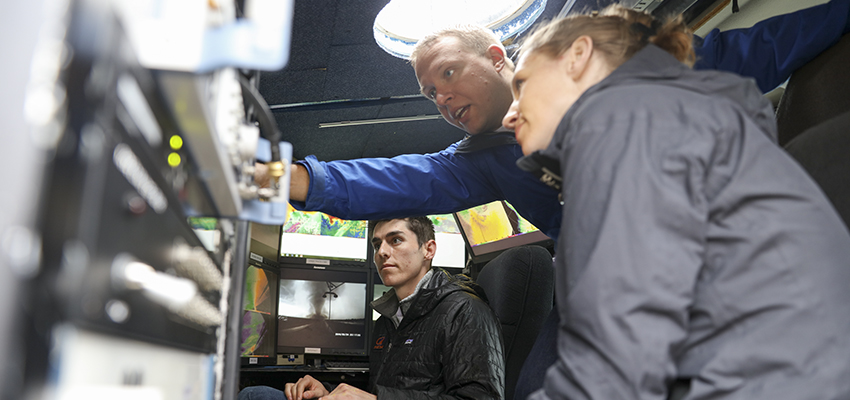
HWS News
26 February 2019 • Faculty • Research Metz Studies Lake Effect Snow Bands
A weather phenomenon associated with lake effect snow bands in the Great Lakes region is the subject of an article by Associate Professor of Geoscience Nicholas Metz published in The Journal of Applied Meteorology and Climatology. Metz co-authored the article along with HWS students Peyton Capute '18, Molly Neureuter '18 and Emily Ott '17, and two students from Valparaiso University, Zach Bruick and Michael Sessa.

Titled An Investigation of Cold-Season Short-Wave Troughs in the Great Lakes Region and their Concurrence with Lake Effect Clouds, the article explores a common winter weather event in upstate New York: the occurrence of bands of snow off of the Great Lakes that produce considerable snowfall in a short period of time.
"What's so challenging about forecasting them is that it can be snowing heavily in one location and five miles away there might be a clear sky," says Metz. "Very small undulations in the snow bands can have a huge impact on the weather in a region, and there are these features in the upper-portion of our atmosphere called short-wave troughs that can contribute to dramatic changes in these bands."
"Since the short wave troughs occur so frequently in the Great Lakes region during the winter," says Metz, gaining a better understanding of how often they interact with lake-effect bands is an important step in improving the accuracy of weather predictions. "Meteorologists have known for a long time that these troughs impact [snow] bands," says Metz. "But there hasn't been a thorough study looking into how often they cross the lakes while there is an ongoing lake effect snow band."
"Research for the article was conducted over two summers by the five student co-authors. The process was very collaborative," says Ott, who works as a supply chain professional with Unilever. "We crunched data and worked hard at writing, while working closely with Professor Metz."
Capute, who is now a doctoral student at State University of New York at Albany studying the impacts of arctic cyclones on sea ice depletion, believes the HWS project gave her skills that are important to her graduate work. "Having the opportunity for undergraduate research is an invaluable experience for the field of atmospheric science," she says. "I built a skillset through doing research as an undergraduate that has allowed me to make a smooth transition into my Ph.D. work and my future career."
Metz says that research opportunities such as this are rare at undergraduate institutions. "I don't think there are many places where undergrads contribute in such an important way as they do at HWS," he says. "[HWS students] produce top quality work that can be compared favorably to what students might produce at any research institution in the country."
